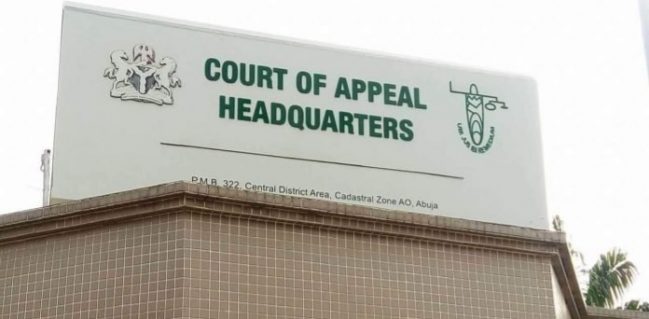

The Court of Appeal in Abuja on Wednesday set aside the judgment of the Federal High Court sitting in Umuahia which nullified the provision of Section 84(12) of the Electoral Act 2022.
A three-member panel of the court presided over by Justice Hamma Akawu Barka held that the Federal High Court lacks the jurisdiction to entertain the matter because the plaintiff, Nduka Edede, lacked the locus standi to institute the suit in the first place.
The upper court also held that Edede did not establish any cause of action to have warranted his approaching the lower court on the issue because he did not establish that he was directly affected by the provision.
Read Also: Ominnikoron Was Employed 5 Months Before The Murder Of Bamise- BRT Operator
But despite its position on the validity of the suit, the court still when on to determine the appeal on merit.
The upper court, after reviewing the facts of the case, held that 84(12) of the Electoral Act 2022 is unconstitutional because it violates Section 42 (1)(a) of the Constitution and denied a class of Nigerian citizens their right to participate in elections.
The judgment was on the appeal marked: CA/OW/87/2022 filed by the PDP.
It will be recalled that the High Court in Umuahia, had in March, struck down section 84(12) of the Electoral Act, 2022 and ordered that it should be deleted by the Attorney-General of the Federation for being inconsistent with the Constitution.
Barely 24 hours after the judgement was delivered, the AGF, Mr Abubakar Malami, SAN, announced his decision to immediately comply with the court order.
President Muhammadu Buhari before he signed the Electoral Act Amendment Bill 2022 into law, also expressed his reservations with that portion of the electoral law, which he described as discriminatory.
Specifically, section 84(12) of the Electoral Act, 2022, made it mandatory that political office holders must firstly resign from office before they could vie for any elective position.
It reads: “No political appointee at any level shall be a voting delegate or be voted for at the convention or congress of any political party for the nomination of candidates for any election.”
The PDP had sued the President, the Attorney General of the Federation, the Senate President, the Speaker of the House of Representatives and the Clerk of the National Assembly.
It also sued the Senate Leader, House of Representatives Leader, and the Independent National Electoral Commission as 1st to 8th defendants respectively.
Others include Deputy Senate President, Deputy Speaker of House of Representatives, Deputy Senate Leader, and Deputy Leader of the House of Representatives as 9th to 12th defendants in the matter.
The PDP had challenged the legality or otherwise of the National Assembly tinkering with the Electoral Act after it had been signed into law by President Muhammadu Buhari.
Amidst debate about the subject matter, a Federal High Court sitting in Umuahia and presided over by Justice Evelyn Anyadike, on March 18, ordered the AGF to delete Section 84(12) of the Act.
Anyadike, in the judgment, held that the section was “unconstitutional, invalid, illegal, null, void and of no effect whatsoever and ought to be struck down as it cannot stand when it violates the clear provisions of the Constitution.”
Anyadike held that Sections 66(1)(f), 107(1)(f), 137(1)(f), and 182(1)(f) of the 1999 Constitution already stipulated that appointees of government seeking to contest elections were only to resign at least 30 days to the date of the election.






















